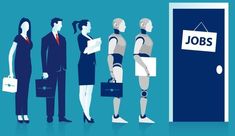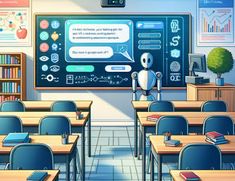
Introduction
A Brave New World of Work?
The once-futuristic concept of Artificial Intelligence (AI) has become a tangible reality, rapidly transforming industries and reshaping our daily lives. In its simplest form, AI refers to machines that can simulate human cognitive functions like Learning and problem-solving. Core functionalities include machine learning, which allows AI systems to improve their performance through data analysis, and deep Learning, where AI mimics the structure and function of the human brain for complex tasks like image recognition.
These advancements are blurring the lines between human and machine capabilities. Self-driving cars navigate city streets, facial recognition software unlocks smartphones, and AI-powered chatbots handle customer service inquiries. The increasing presence of AI across various sectors, from manufacturing to finance to healthcare, begs a crucial question: What does this mean for the future of work?
This paper delves into the complex relationship between AI and employment. We will analyze the impact of AI on job displacement and creation, exploring how this technology is reshaping the workforce landscape. We will then delve into potential scenarios for the future of work in the age of AI, considering the changing nature of work, the importance of human-specific skills, and necessary policy considerations. Finally, the paper will conclude with key takeaways and highlight areas for further discussion in this evolving field.
This introduction effectively captures the reader’s attention, defines AI in layperson’s terms, highlights its advancements, and sets the stage for the paper’s focus: exploring the impact of AI on employment and the future of work.
The Rise of AI and Automation

A Legacy of Change: Automation and the Rise of AI
The fear of technology replacing human workers is not a new phenomenon. The Industrial Revolution saw the rise of machines that automated tasks previously done by hand, leading to job displacement in sectors like textiles. However, history also shows that these advancements often create new opportunities, transforming work and leading to entirely new industries.
The AI Revolution:
Artificial Intelligence (AI) represents the next wave of automation, potentially significantly impacting the workforce. Machine Learning, a core function of AI, allows machines to learn from data without explicit programming. They can identify patterns, make predictions, and improve their performance. Deep Learning, a subset of machine learning, builds complex neural networks modeled on the human brain, enabling tasks like image and speech recognition. Natural Language Processing (NLP) allows AI to understand and respond to human language, making applications like chatbots and voice assistants possible.
AI in Action: Automating Tasks Across Industries
These advancements are already transforming various sectors:
- Manufacturing: AI-powered robots perform complex assembly tasks with greater precision and speed than humans.
- Healthcare: AI algorithms analyze medical images for diagnosis and treatment planning, while chatbots answer patient inquiries and schedule appointments.
- Finance: AI automates fraud detection, analyzes financial markets, and personalizes investment recommendations.
- Customer Service: Chatbots powered by NLP handle routine inquiries, freeing up human agents for more complex issues.
The Economic Benefits of AI Automation
There’s no denying the economic benefits of AI automation. Increased productivity, efficiency, and cost reductions are attractive propositions for businesses. AI can handle repetitive tasks faster and more accurately, leading to higher output. Additionally, automation can free human employees to focus on higher-level tasks requiring creativity, critical thinking, and social skills.
However, the conversation around AI and the future of work can only partially focus on economic benefits. The potential for job displacement in certain sectors is a real concern that needs to be addressed. The following section will delve into this complex issue.
The Impact of AI on Employment: A Double-Edged Sword

The rise of AI and automation presents a double-edged sword for employment. While it offers economic benefits, it also carries the potential for significant job displacement.
A. The Looming Shadow of Job Displacement:
Jobs with a high degree of routine, predictability, and manual dexterity are most susceptible to AI automation. Studies by Oxford University and McKinsey Global Institute estimate that up to 80% of jobs in manufacturing, transportation, and administrative support could be automated by 2030.
The following sectors are particularly vulnerable:
- Manufacturing Assembly Lines: Robots can perform repetitive tasks with greater precision and speed than humans.
- Data Entry and Bookkeeping: AI can efficiently handle large datasets and automate record-keeping tasks.
- Telemarketing and Customer Service: Chatbots powered by AI can answer routine inquiries and handle basic customer interactions.
The human cost of job displacement cannot be ignored. Workers in these sectors face the possibility of unemployment and the challenge of acquiring new skills to re-enter the workforce.
B. The Rise of New Opportunities: Jobs for the AI Age
However, AI is not all doom and gloom. It’s also creating new job opportunities in several areas:
- AI Development and Engineering: As AI technology evolves, there’s a growing demand for specialists in AI development, machine learning, and deep Learning.
- Data Analysis and Interpretation: The vast amount of data generated by AI systems requires skilled professionals to analyze, interpret, and draw meaningful insights.
- Cybersecurity: As AI becomes more sophisticated, so too do the threats posed by cybercriminals. Cybersecurity experts are crucial to protecting AI systems from hacking and manipulation.
- Robot Maintenance and Repair: As AI-powered robots become increasingly integrated into various industries, skilled technicians will be needed for maintenance, repair, and operation.
The future of work will likely see an increased emphasis on human-AI collaboration. Humans will bring their creativity, critical thinking, and social skills to the table, while AI will handle the heavy lifting of data processing, repetitive tasks, and complex calculations. To thrive in this environment, workers must develop a hybrid skillset combining technical knowledge and human-centric abilities.
C. Bridging the Skills Gap: The Need for Retraining
The current workforce might not be fully prepared for the skills demanded by AI-driven jobs. A significant skills gap exists, and addressing it requires proactive measures:
- Government-backed retraining programs: Governments can be crucial in funding and implementing retraining programs to equip workers with the necessary skills for AI-driven jobs.
- Upskilling initiatives by companies: Businesses should invest in upskilling programs for their existing workforce to ensure they can adapt to the changing technological landscape.
- Education system reforms: Educational institutions must adapt their curriculums to incorporate skills like data analysis, critical thinking, and problem-solving, which will be essential in the AI age.
The ethical considerations of job displacement due to AI cannot be ignored. Governments and companies are responsible for supporting workers who might experience job losses through retraining initiatives and social safety nets.
By proactively addressing the skills gap and fostering a culture of lifelong Learning, we can ensure a smoother transition into the future of work shaped by AI.
The Future of Work in the Age of AI
A. Reimagining Work: Scenarios for the Human-AI Collaboration
The future of work in the age of AI is uncertain, but several potential scenarios emerge based on the interplay of AI and human capabilities:
- Human-AI Collaboration: This most likely scenario envisions a future where humans and AI work together in a complementary fashion. AI will handle routine tasks, freeing human workers to focus on higher-order skills like creativity, problem-solving, and strategic thinking. The emphasis will be on building effective human-AI teams that leverage both strengths.
- Universal Basic Income (UBI): Widespread job displacement due to AI automation has led to discussions about UBI, a guaranteed income for all citizens, regardless of employment status. This could act as a social safety net for those who lose their jobs to automation, allowing them to pursue education and retrain for new opportunities.
- Human-Centered Future of Work: Ideally, the future of work should be centered on human needs and capabilities. AI should be seen as a tool to augment human skills and creativity, not replace them. This approach prioritizes innovation and human well-being and focuses on jobs requiring unique human skills like empathy, social intelligence, and cultural understanding.
B. Reshaping the Workplace: Flexibility and Location Independence
AI will likely reshape the physical and temporal aspects of work:
- Remote Work: As AI automates tasks traditionally performed in offices, the rise of remote work will likely continue. This could lead to a more geographically dispersed workforce and blurring traditional work-life boundaries.
- Flexible Hours: AI’s ability to handle tasks 24/7 might lead to more flexible work arrangements, allowing employees to tailor their work schedules to their needs and preferences.
- The Gig Economy: The increasing demand for specialized skills in AI-driven industries might fuel the gig economy’s growth, where individuals work on a project-by-project basis rather than holding traditional full-time jobs.
C. The Enduring Power of Soft Skills: The Human Advantage
While AI excels at data processing and automation, it lacks the “soft skills” that remain essential for human workers in the AI age:
- Critical Thinking and Problem-Solving: The ability to analyze complex situations, identify problems, and develop innovative solutions will be crucial in navigating an ever-changing work environment.
- Creativity and Innovation: Human creativity will remain a key differentiator. The ability to generate new ideas, solve problems in unconventional ways, and adapt to changing circumstances will be highly sought-after skills.
- Communication and Collaboration: Effective communication and collaboration skills will allow humans to work effectively with AI and each other in diverse teams. Building relationships, articulating ideas, and fostering a positive work environment will be key to success.
- Emotional Intelligence: Understanding human emotions, building trust, and navigating interpersonal relationships are uniquely human skills that will remain essential for effective leadership and teamwork.
By embracing lifelong Learning and developing these soft skills, humans can remain valuable contributors to future work alongside their AI collaborators.
V. Policy Considerations and Recommendations
The transformative power of AI necessitates proactive measures from governments, businesses, and individuals to navigate the future of work.
A. Government Policy: Balancing Innovation and Human Well-being
- Promoting Responsible AI Development: Governments can play a crucial role in encouraging ethical AI development through regulations addressing bias, transparency, and accountability.
- Investing in Worker Retraining: Governments can invest in retraining programs to equip workers with the skills needed for AI-driven jobs, mitigating the negative impacts of job displacement.
- Social Safety Nets: Exploring and implementing policies like Universal Basic Income (UBI) can provide a safety net for those who lose jobs due to automation.
B. Business Strategies for the AI Age
- Upskilling the Workforce: Businesses should invest in upskilling their existing workforce to ensure they can adapt to new technologies and remain competitive. This can involve training programs in areas like data analysis, critical thinking, and collaboration with AI.
- Fostering a Culture of Lifelong Learning: Companies should encourage a culture of lifelong Learning by providing employees with opportunities for continuous skill development.
- Ethical Considerations in AI Implementation: Businesses must consider the ethical implications of AI implementation, ensuring fairness, transparency, and responsible data handling practices.
C. Individual Strategies for Career Development
- Embrace Continuous Learning: In the dynamic AI landscape, continuous Learning is essential. Individuals should actively seek opportunities to learn new skills, stay updated on emerging technologies, and adapt their skillsets to meet evolving industry demands.
- Develop Adaptability: The ability to adapt to change will be a key asset in the future of work. Individuals should be open to new challenges, embrace new technologies, and be comfortable working in ever-evolving environments.
- Focus on Soft Skills: While technical skills are important, soft skills like communication, collaboration, critical thinking, and problem-solving will remain crucial for success.
By working together, governments, businesses, and individuals can shape a future of work driven by AI that fosters innovation, human well-being, and a smooth transition for the workforce.
Conclusion
A Legacy of Change: AI and the Evolving Landscape of Work
This paper has explored the complex relationship between Artificial Intelligence (AI) and employment. We have analyzed the potential for AI to displace jobs in sectors reliant on repetitive tasks while acknowledging its role in creating new opportunities in areas like AI development, data analysis, and cybersecurity.
The future of work will likely see an increased emphasis on human-AI collaboration, where AI handles data processing and routine tasks. At the same time, humans leverage their creativity, critical thinking, and social skills to solve complex problems and drive innovation.
A Human-Centered Future
Moving forward, it is crucial to focus on human-centered AI development. AI should be seen as a tool to augment human capabilities, not replace them. Governments, businesses, and individuals all have a role to play in ensuring a smooth transition into the future of work.
Looking Ahead: Areas for Further Exploration
The impact of AI on employment remains an evolving field with ongoing research and discussion. Further exploration is needed in areas such as the ethical considerations of AI development, the potential impact of AI on specific professions, and the effectiveness of various policy solutions to mitigate job displacement and facilitate worker retraining.
By fostering proactive dialogue and collaborative efforts, we can navigate this era of transformation and ensure that AI technology serves as a force for progress, empowering both humans and machines to thrive in the future of work.

